Conservatives lead by 12 as only 27% think the Prime Minister should run again.
From August 18 to 23, 2023, Abacus Data conducted a national survey of 2,189 adults exploring several topics related to Canadian politics and current events as part of our regular national omnibus surveys. In this survey, we oversample Ontario to a total of 1,068 and Atlantic Canada to 269 (we will be oversampling Atlantic Canada regularly to make sure we get a more accurate read of that region).
Our latest reading of political opinions in Canada finds the Conservatives opening up a 12-point lead over the Liberals, the largest lead for the Conservatives we have measured since the 2015 federal election. 38% would vote Conservative (up 1 since early August), 26% Liberal (down 2) and 19% would vote NDP (unchanged).
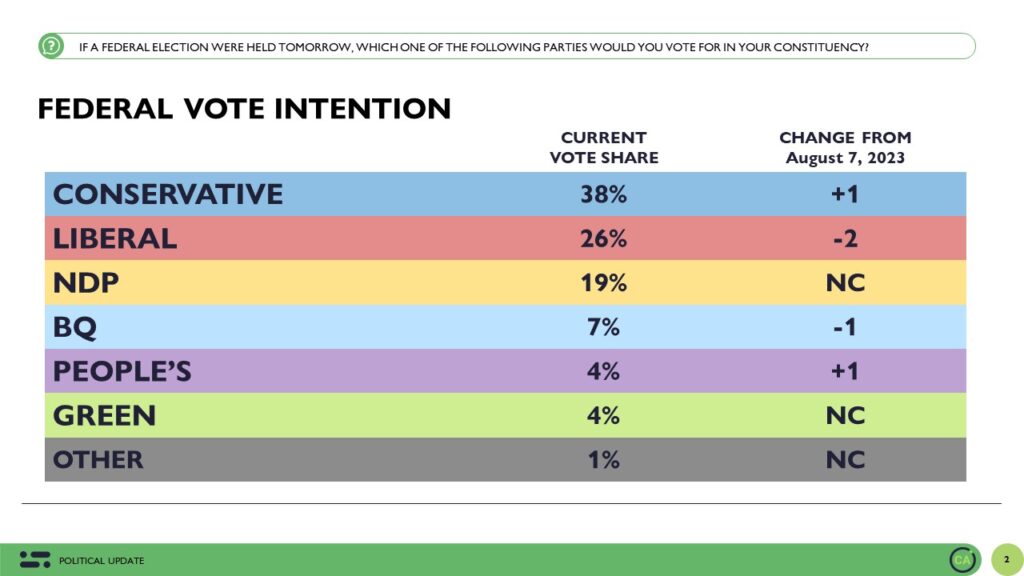
Regionally, the Conservatives are ahead by 19-points in British Columbia, 40-points in Alberta, and 22-points in Saskatchewan and Manitoba. In all three regions/provinces, the Liberals are in third place with the NDP in second.
In Ontario, the Conservatives are ahead by 8 while the BQ is slightly ahead in Quebec by 5 points over the Liberals. In Atlantic Canada, we have the two parties statistically tied with the Conservatives at 38% and the Liberals at 33%.
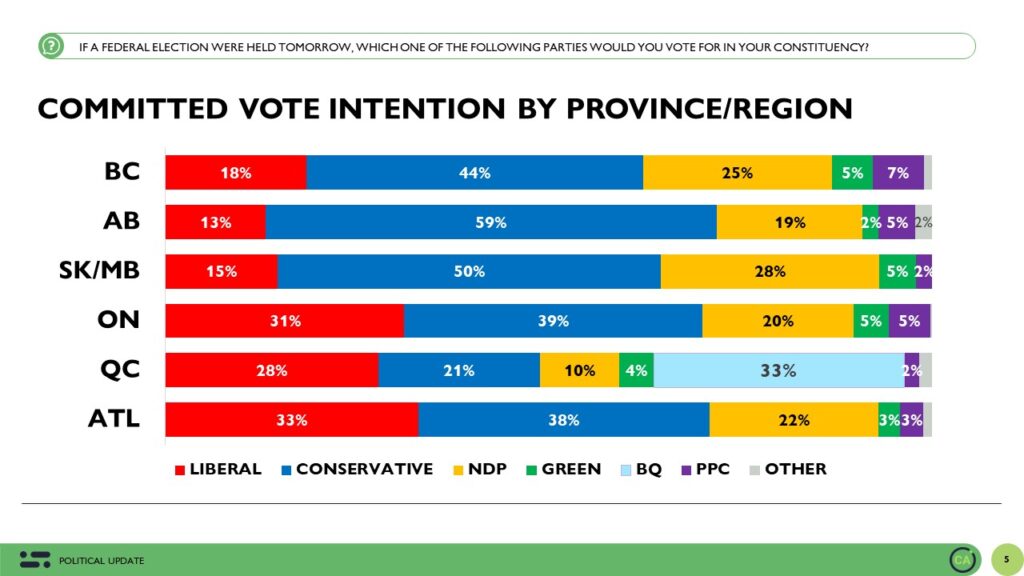
In Ontario, where we surveyed over 1,000 people, the Liberals lead by 6 in Toronto but trailed the Conservatives by 10 in the GTHA (postal codes that start with L). The two parties are tied in Eastern Ontario while the Conservatives have a 20-point lead in Southwestern Ontario.
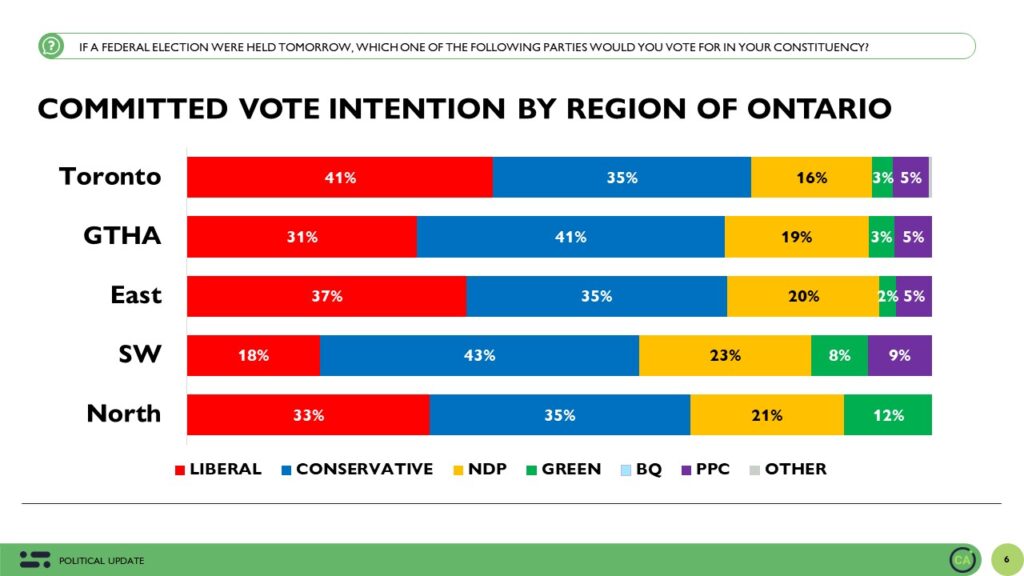
The Conservatives lead across all age groups and among men and women.
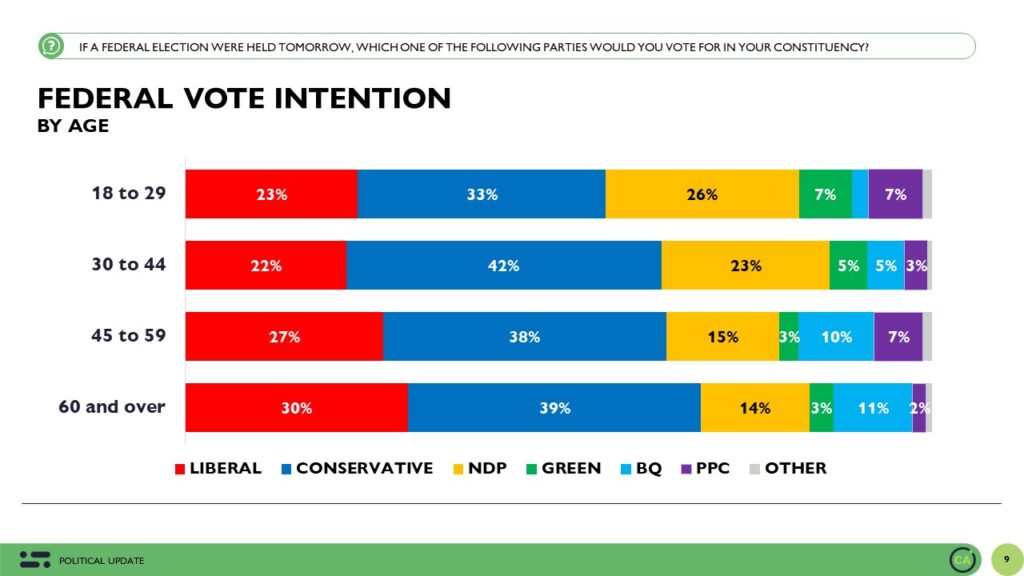

Should Prime MInister Trudeau run again or step down and let someone else become Liberal leader and Prime Minister?
Overall, 56% of Canadians think Trudeau should step down and let someone else become Liberal leader and Prime Minister while 27% feel he should run again. 17% were unsure.
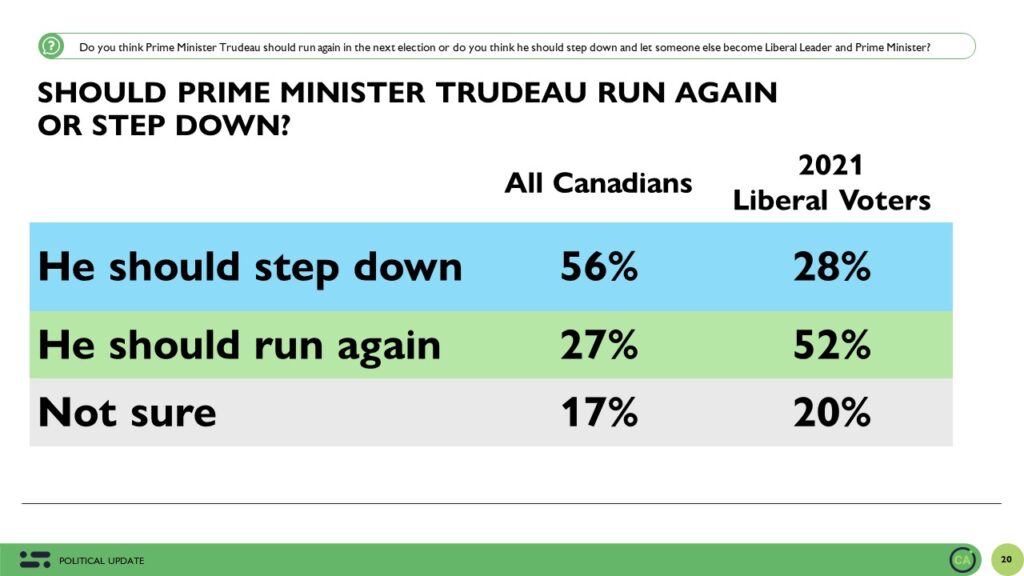
Quebecers were the most likely to want to see Trudeau run again (33%) while Albertans were the least likely (15%). 28% in Ontario and 26% in BC want the Prime Minister to run again.
But perhaps most striking, 1 in 4 of those who said they voted Liberal in 2021 want Trudeau to step down. Among this group, 46% would vote Liberal again but 35% would vote Conservative and 13% would vote NDP. Those saying they would vote Conservative or NDP constitute 4% of decided voters.
Impressions of Pierre Poilievre have improved
Finally, when we look at public impressions of the party leaders, we see a notable improvement in Pierre Poilievre’s personal numbers. Today, 34% have a positive impression of the Conservative leader (up 4 in 2 weeks) while those with a negative view are down 3 to 35%. Both of these shifts are outside the margin of error. Poilievre’s net favourable rating is -1.
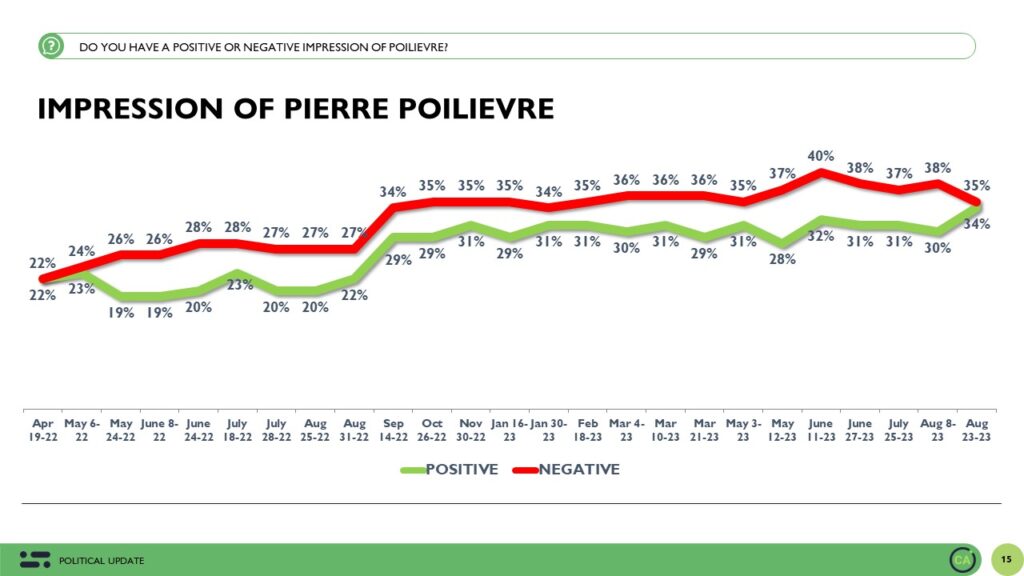
Justin Trudeau’s image is largely unchanged from last wave. 53% have a negative impression (a new high) while 29% have a positive view for a net favourable rating of -24.
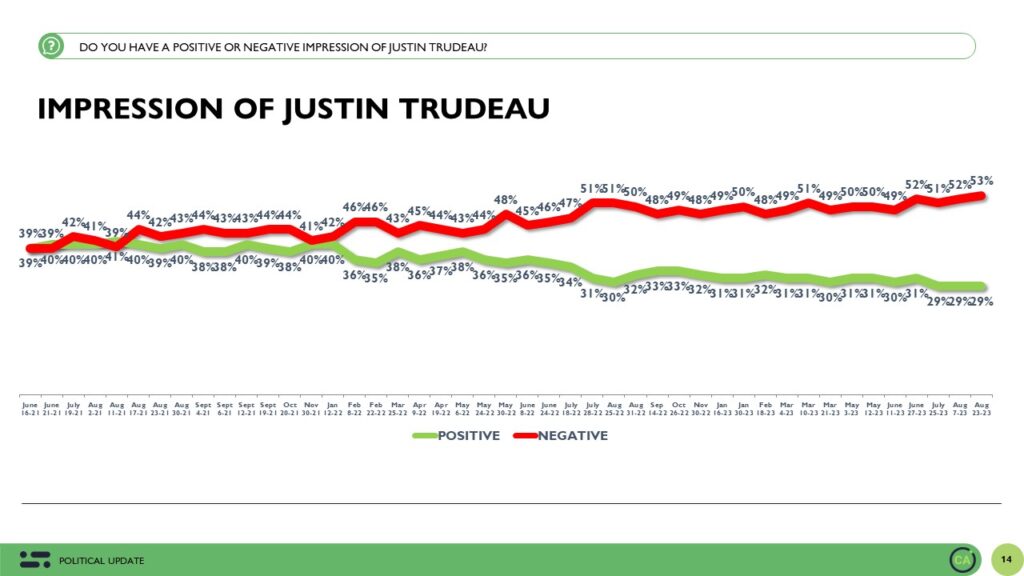
Jagmeet Singh’s rating is also largely unchanged with 34% positive and 31% negative for a net rating of +3.
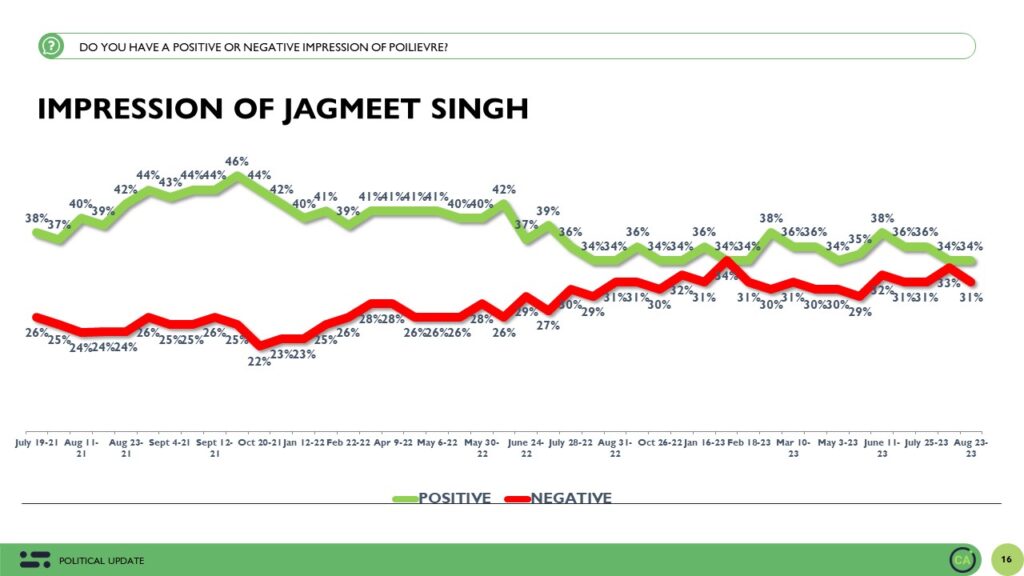
Who has seen the Conservative ad and how do people react?
We showed English speaking respondents the video below and asked whether they had seen the video and how it impacts their impression of Pierre Poilievre.
Overall, 28% of English speaking Canadians said they definitely recall seeing the ad with another 12% saying they think so. That’s a possible 40% penetration in just over two weeks.
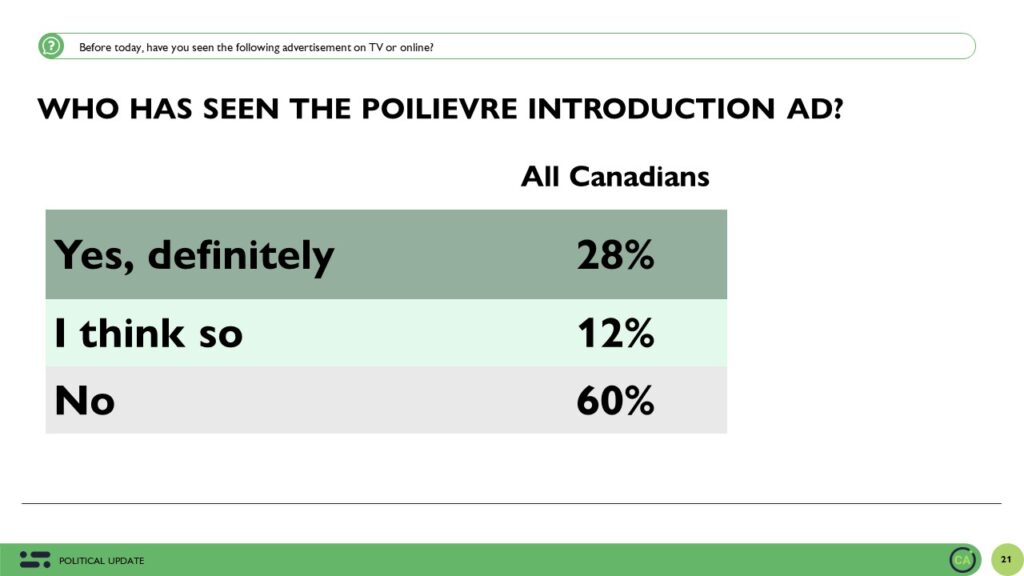
When asked whether the video makes them feel better, worse, or it has no impact on their impression of Poilievre, 49% says it makes them feel better, 8% worse, and 42% say it doesn’t impact their views.
Younger Canadians were more likely to say the video improved their impression of Poilievre as did almost half of women. 54% of accessible Conservatives (those open to voting Conservative but wouldn’t vote for the party today) say the video makes them feel better about Poilievre.
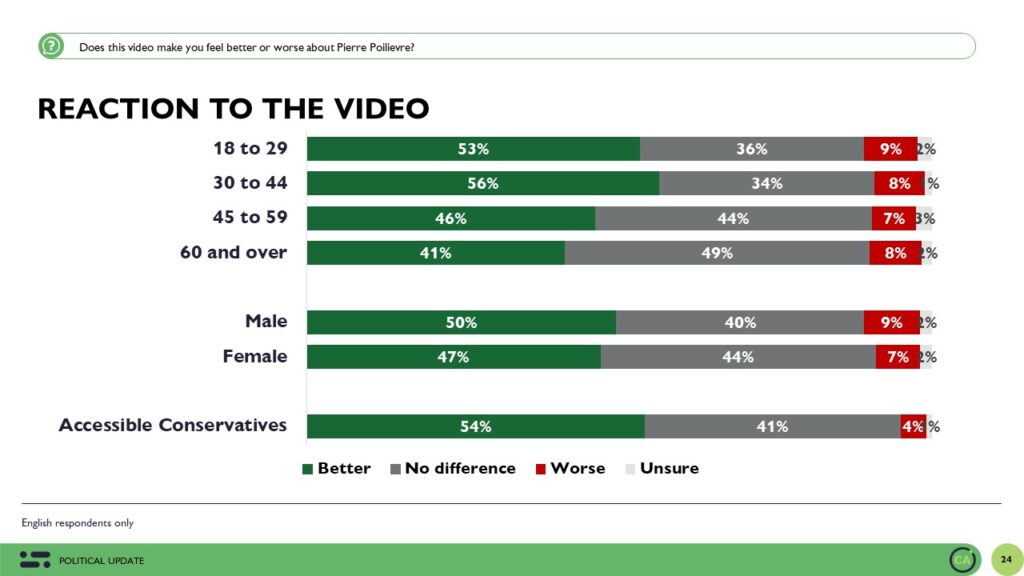
Perhaps most important, 1 in 3 NDP and Liberal voters in 2021 say the video makes them feel better.
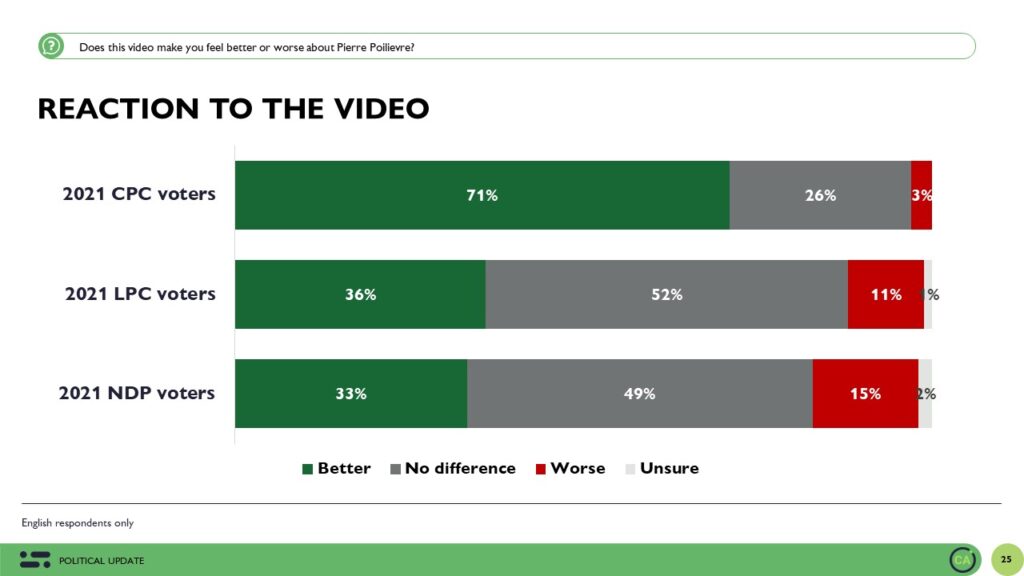
The Upshot
According to Abacus Data Chair and CEO, David Coletto:
“Our most recent Abacus Data survey clearly underscores the changing dynamics in Canadian politics. The Conservatives are leading considerably, particularly in regions like British Columbia, Alberta, and Saskatchewan/Manitoba. Their lead in Ontario, combined with a tight race in Atlantic Canada, suggests that the party has garnered widespread appeal over the past few months and the shift wasn’t a blip and could be the new state of play. The fact that the Conservatives lead across all age groups and among both genders emphasizes a broad-based support.
These results underscore just how challenging the environment is for the Liberals and Prime Minister Trudeau. TMore than half of Canadians believe it’s time for Prime Minister Trudeau to step aside, letting another leader take the reins of the Liberal party. Interestingly, even a significant portion of those who voted Liberal in 2021 now share this sentiment. This, combined with Trudeau’s net favourable rating being at -24, suggests that the Prime Minister may no longer be an asset for his party in its quest to win another election.
At the same time, there’s evidence in this survey that Pierre Poilievre, the Conservative leader, has improved his standing with Canadians over the past few weeks, with his net favourable rating now almost neutral. This is in stark contrast to Trudeau’s rating. Furthermore, the impressive penetration of the Conservative ad in just over two weeks, along with the largely positive reception (especially among younger Canadians and women), shows the potential long-term impact of this campaign – especially in the absence of a response from Poilievre’s opponents.
Even more striking is the ad’s positive reception among 2021 NDP and Liberal voters, indicating a potential shift in the electoral base. “
Methodology
The survey was conducted with 2,189 Canadian adults from August 18 to 23, 2023. A random sample of panelists were invited to complete the survey from a set of partner panels based on the Lucid exchange platform. These partners are typically double opt-in survey panels, blended to manage out potential skews in the data from a single source.
The margin of error for a comparable probability-based random sample of the same size is +/- 2.1%, 19 times out of 20.
The data were weighted according to census data to ensure that the sample matched Canada’s population according to age, gender, educational attainment, and region. Totals may not add up to 100 due to rounding.
This survey was paid for by Abacus Data Inc.
Abacus Data follows the CRIC Public Opinion Research Standards and Disclosure Requirements that can be found here: https://canadianresearchinsightscouncil.ca/standards/
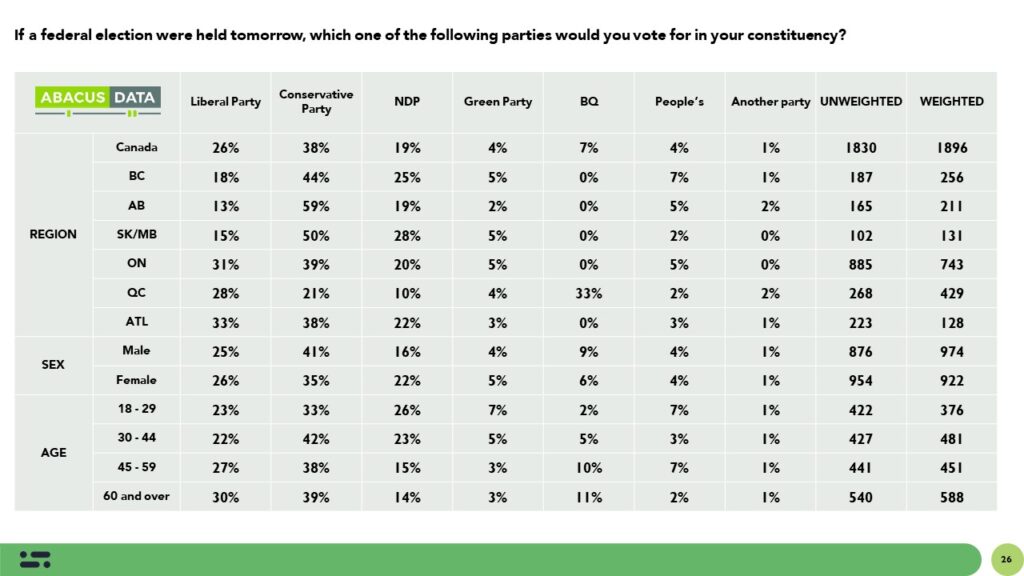
ABOUT ABACUS DATA
We are the only research and strategy firm that helps organizations respond to the disruptive risks and opportunities in a world where demographics and technology are changing more quickly than ever.
We are an innovative, fast-growing public opinion and marketing research consultancy. We use the latest technology, sound science, and deep experience to generate top-flight research-based advice to our clients. We offer global research capacity with a strong focus on customer service, attention to detail, and exceptional value.
We were one of the most accurate pollsters conducting research during the 2021 Canadian election following up on our outstanding record in 2019.
Contact us with any questions.
Find out more about how we can help your organization by downloading our corporate profile and service offering.